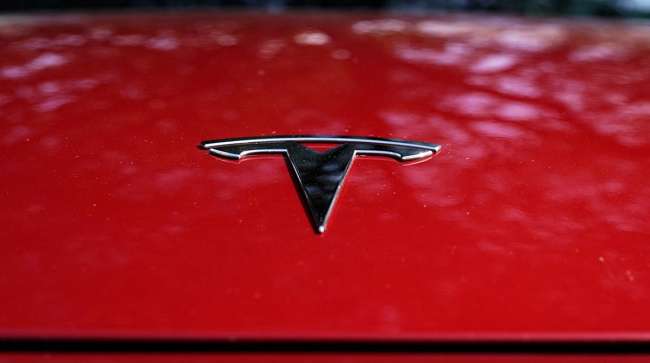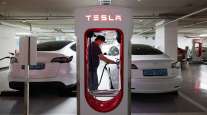Associated Press
Tesla Income Jumps 20% to $2.7 Billion

[Stay on top of transportation news: Get TTNews in your inbox.]
SAN FRANCISCO — Elon Musk’s big bet that Tesla price cuts could boost sales and profits amid increasing competition and poor economic sentiment appears to be yielding mixed results. Sales jumped and the company beat analyst expectations for net income in the April-June quarter, although the company’s profit margins declined. Tesla shares followed suit in after-hours trading.
The Austin, Texas, maker of electric vehicles, solar panels and batteries reported net income of $2.7 billion in the quarter, a 20% increase from a year ago. Earnings per share also rose 20% to 78 cents when measured via generally accepted accounting principles. Total revenue rose 47% to $24.93 billion.
Analysts, however, tend to focus on Tesla’s own measurement of profit, which excludes stock-based compensation expense. By that measure, Tesla’s net income zoomed to $3.15 billion, or 91 cents a share, sharply exceeding average analyst estimates of 80 cents per share according to FactSet. Some analysts had expected profits to fall because of the price cuts.
Tesla shares, however, initially stayed flat at roughly $292 in after-hours trading immediately following the earnings report, up a smidgen from their close at $291.26. As Tesla executives spoke to analysts in a conference call, shares slipped more than 4%.
Tesla reported strong vehicle delivery numbers on July 2, saying they rose 83% compared to the year-earlier quarter after the company cut prices several times on its four electric vehicle models. Tesla sold a record 466,140 vehicles worldwide from April through June, nearly double the 254,695 it sold during the same period a year earlier.
Q2 2023 Earnings Call https://t.co/mZu4TeZ6lE — Tesla (@Tesla) July 19, 2023
The vast majority of those sales involved Tesla’s popular Model 3 sedans and Model Y crossover SUVs.
But the earnings report provided mixed messages on one of the larger questions facing Tesla: whether the automaker’s discounting strategy can boost sales while preserving its profit margins. Tesla’s operating margin, which represents how efficiently sales are turned into pretax profits, fell to 9.6% in the April-June quarter, down significantly from 14.6% a year earlier. The measure had also declined sharply in the January-March quarter.
While pressures on profitability and pricing continue to weigh on Tesla, Jeff Windau, an analyst with Edward Jones, said he took heart from some management comments about cost control and said the company’s overall trajectory remains sound.
“The long-term drivers for growth remain in place and there are just going to be some near-term headwinds in the current environment we’re in,” he said.
In the company’s conference call with analysts, Musk praised the company’s performance despite high interest rates and what he called significant economic uncertainty, then quickly changed the subject to Tesla’s advanced projects such as its so-called “full self-driving” software.
Despite the name, Tesla cars with the software enabled cannot drive themselves, and the company warns drivers that they have to be ready to intervene at all times. Musk extolled Tesla’s work on a new machine-learning system it calls Dojo that the company plans to use for improving its self-driving software.
Want more news? Listen to today's daily briefing above or go here for more info
Musk also said that Tesla should deliver its long-promised Cybertruck — an unusual looking pickup with an angular design that might not look out of place in a “Mad Max” movie — by the end of the year. Tesla announced Saturday that the first Cybertruck had rolled off the assembly line.
But analysts aren’t convinced that the vehicle will be widely available any time soon, not least because other automakers have already unveiled more conventional looking electric pickups such as the Ford F-150 Lightning.
“I don’t think we’ll see any meaningful volumes, certainly not this year,” said Seth Goldstein, an analyst with Morningstar Research. “Not even next year. Maybe we’re looking more into 2025, ’26, ’27 until we see them.”




